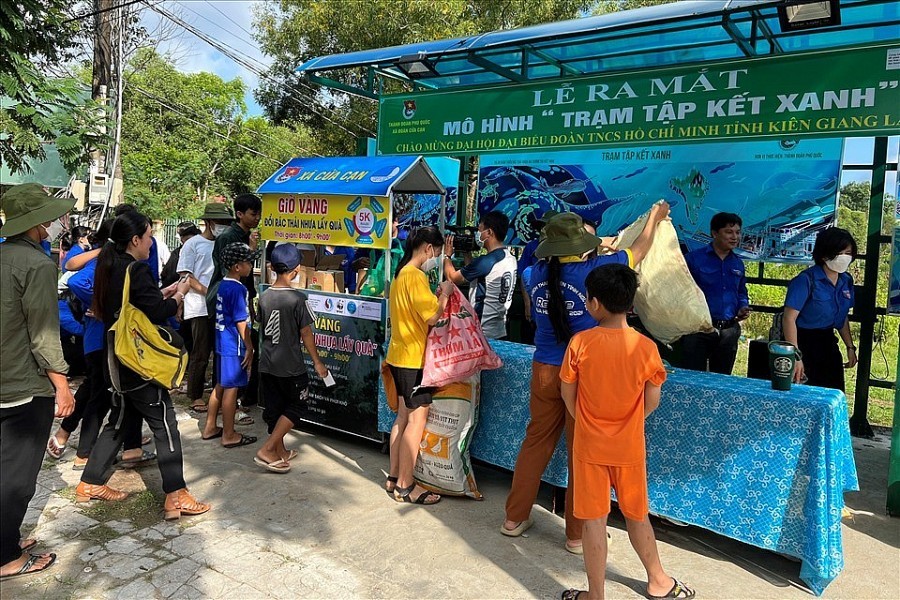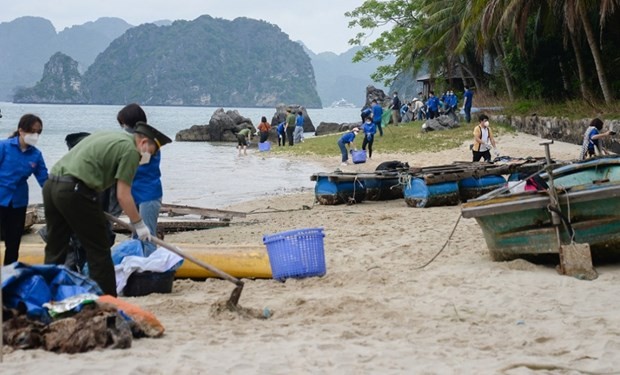
Cut off plastic waste for the development sustainable tourism
Latest
 |
| Green gathering stations help Phu Quoc reduce pressure on plastic waste. (Source: Bao Cong Thuong) |
Environmental pollution hinders tourism
According to statistics of the Institute for Tourism Development Research (General Department of Tourism), Vietnam's sea surface occupies around 1,000,000 square kilometers. The country also has over 2,770 coastal islands, along with a series of beautiful beaches stretching from the North to the South, each with a different characteristic. These are Vietnam’s natural advantage to develop tourism.
Over 70% of international tourists and 50% of domestic tourists choose to visit Vietnam’s coastal areas, bringing 70% of the total revenue of the country’s tourism. However, environmental pollution is one of the factors hindering the development of this industry.
As claimed by the Ministry of Natural Resources and Environment (MONRE), the main causes of marine pollution are: widespread industrial and tourism development, unreasonable aquaculture; population growth and poverty; people’s simple lifestyle and low intellectual level; and inadequate institutions and policies.
In addition, 70-80% of ocean waste comes from inland, especially from factories, enterprises, industrial parks, residential areas discharge untreated wastewater and solid waste into rivers in coastal plains or directly into the sea. Meanwhile, tourism activities have contributed about 20-30% of waste on the ecological environment and natural landscape of the sea.
For example, oil pollution in coastal sea water caused by tourist boats, recreational facilities, water sports, coral exploitation, etc. also contribute to the degradation of the tropical ecosystems.
According to MONRE’s annual environmental monitoring reports, on average, each tourist throw away about 1.2 kg of trash per day; each same-day visitor throw away about 0.5 kg of trash per day. In which, plastic waste including plastic bags, plastic cups, plastic bottles, plastic boxes, foam boxes, etc., accounting for about 60%.
It is worth mentioning that these types of waste take at least 100-200 years to decompose, thus, both degrading the beauty of the beaches and causing heavy environmental pollution.
"Declaring war" on plastic waste
Vietnam’s tourism industry is recovering and reopening for tourists. Localities with beaches, in addition to organizing activities to attract tourists to boost economic recovery, they also keep a very keen eye on marine environment protection. Recently, many localities have been focusing on reducing plastic waste.
For example, in Co To district (Quang Ninh), from September 1, it’s People's Committee has piloted the regulation that tourists should not bring plastic bottles, plastic bags and other materials with risk of environmental pollution when traveling to the island.
This is one of the solutions that Co To is implementing to make it into an island without plastic waste. The pilot will be implemented for a few months, then it will be up for official application. In order to effectively implement this regulation, Co To district requires transportation companies and tour operators to ask tourists not to bring any plastic bottles, plastics bags and other objects that are at risk of causing environmental pollution onto the boats.
 |
| Garbage collection on Lom Bo Island in Ha Long Bay. (Source: Bao Quang Ninh) |
In Hoi An (Quang Nam), a tourist hub in central Vietnam, it is recorded that about 30% of daily waste (about 110 tons) are low-value plastic waste (disposable cups and straws, styrofoam boxes, milk cartons and food packages). Tourism make up 40% of the daily waste in Hoi An. Cu Lao Cham, 20km from the coast of Hoi An, has also officially banned single-use plastic straws, cups and bags.
In Phu Quoc (Kien Giang), with the theme “Towards an island city without plastic waste”, organizations and individuals have carried out different types of works to contribute to cleaning and greening the environment on the island. Most recently, in August, Kien Giang province cooperated with WWF Vietnam to launch a number of green initiatives.
On the business side, Mr. Le Hoang Ha, Director of Emic Travel Company (Hoi An) said that, his company has built 5 tours related to environment protection and community responsibility. This is not only a tourist experience, but also aims to raise awareness about environmental protection, especially changing the perception that tourism isn’t only for enjoyment, but also aim at what visitors will learn after each trip, especially in the conservation and restoration of natural resources.
It can be affirmed that, with the cooperation of local authorities and businesses, along with raising the awareness of tourists, Vietnam's tourism industry quickly "healed" from Covid-19 and moved towards the development of sustainable tourism.

















